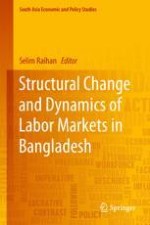2018 | OriginalPaper | Chapter
How Do Education and Skill Development Affect the Transition from “Good-Enough” Job to “Decent” Job?
Authors : Selim Raihan, Mahtab Uddin
Published in: Structural Change and Dynamics of Labor Markets in Bangladesh
Publisher: Springer Singapore
Activate our intelligent search to find suitable subject content or patents.
Select sections of text to find matching patents with Artificial Intelligence. powered by
Select sections of text to find additional relevant content using AI-assisted search. powered by
